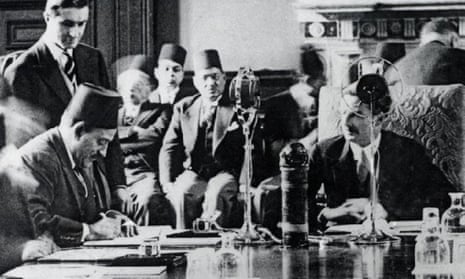Fleet Street, Wednesday
Once again the Locarno Room at the Foreign Office to-day saw history made is the British and Egyptian representatives signed the Anglo-Egyptian Treaty, which marks a new stage in the relations of the nations. The signatories entered the great room talking together, English and Egyptian, Mr Anthony Eden, Nahas Pasha, the Egyptian Premier, Mr Ramsay MacDonald, Mahmoud Pasha, Lord Halifax, Sir John Simon, Ismail Sidky Pasha, Makram Ebeid Pasha, Sir Miles Lampson, and others.
On sofas and chairs round the rooms were seated many well-known administrators and Foreign Office officials and wives and relatives of the Egyptian delegates. A group of red-hatted secretaries sat at the top of the room behind Mr Eden, who presided.
Egypt and Britain sat down at the great oblong table, decorated by five water-jugs and glasses, inkstands and pens – not quills now, – and microphones. A battery of cinema and photograph men occupied one end of the room, and whenever anything interesting was happening, it was done to the steady little hiss of the cinema camera. The crimson tarbooshes of the Egyptians gave a bright touch in countenance with the cream and gold room. The Foreign Office wore its best clothes, and one noted that trousers are worn fuller now and morning coats are longer. The spectators regarded the Egyptian ladies as they filed in expecting to see Nefertitis and Cleopatras. Mrs Eden and Lady Lampson were among the English ladies on the rose-coloured sofas.
The speeches
Mr Eden put on his glasses, studied a document, rose, and, speaking in his slightly diffident but unembarrassed tones, began his speech. He mentioned Lord Cromer for his collaboration in the past with the Egyptian representatives, and Sir Miles Lampson for his work to-day, and spoke of the spirit of goodwill displayed by the Egyptian Delegation under the able leadership of their prime minister. He did not mention Zaglul, but Nahas Pasha did – “the great Egyptian leader who conceived the idea of a treaty of friendship and of alliance between our two peoples.” The representative composition of the Egyptian Delegation was stressed. He also paid a tribute to Sir Miles Lampson. “By putting her name to this historic treaty,” he added, “Egypt, cradle of a glorious past civilisation, puts her hand into the hand of the great and free England, thus opening a new era in the relations of East and West.”
Signing
Translations by the interpreter into English or French followed each speech. Then the Egyptians relaxed their official tension, and it was curious to see the red hats suddenly all in motion as the delegates turned to their neighbours, smiled, and greeted one another across the wide table. Their faces resumed the good-humoured friendly look they wore as they entered. Then they settled down to the signing of the treaty, the contents of which were still unknown to all but themselves and the Foreign Office. To-morrow it is to be given out for publication.
Two documents were put before the representatives, the treaty that remains in London and the duplicate which flies to Egypt. One noticed that the Egyptians signed the latter with the pens on the table, but for the former they all used a gold fountain-pen which Nahas Pasha unscrewed and used, and then it was passed down the table to each signatory. It was rolled across the table to the delegates on the other side and so to the five British. Mr Eden was about to sign with an ordinary pen when the Egyptian Premier pointed with a smile to the gold pen which an Egyptian was holding up, and the attendant who was going round with the documents and lemon-coloured blotting paper hurried along with the pen, which Mr Eden duly used for his signature and returned with a bow to the Egyptian Premier, who seemed to have a number of extra documents to sign at the end. It was noticed that the Egyptians did not sign their names in the Arabic way, from right to left, but in the European order.
Mr Eden then terminated the occasion with a few words and a handshake. Something that should have been done a generation ago had been done at last.

Comments (…)
Sign in or create your Guardian account to join the discussion